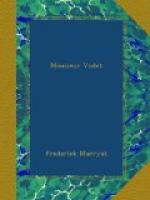“Would they not be too happy to exchange their furs against the corn, the tobacco, and good dried fish of the Shoshones? Now they sell their furs to the Yankees, but the Yankees bring them no food. The Flat Heads take the fire-water and blankets from the traders, but they do so because they cannot get anything else, and their packs of furs would spoil if they kept them.
“Would they not like better to barter them with you, who are so near to them, for good food to sustain them and their children during the winter—– to keep alive their squaws and their old men during the long snow and the dreary moons of darkness and gloom?
“Now if the Shoshones had corn and tobacco to give for furs, they would become rich. They would have the best saddles from Mexico, and the best rifles from the Yankees, the best tomahawks and blankets from the Canadians. Who then could resist the Shoshones? When they would go hunting, hundreds of the other natives would clear for them the forest path, or tear with their hands the grass out of their track in the prairie. I have spoken.”
All the Indians acknowledged that the talk was good and full of wisdom: but they were too proud to work. An old chief answered for the whole tribe.
“Nanawa Ashta is a great chief: he is a brave! The Manitou speaks softly to his ears, and tells him the secret which makes the heart of a warrior big or small; but Nanawa has a pale face—his blood is a strange blood, although his heart is ever with his red friends. It is only the white Manitou that speaks to him, and how could the white Manitou know the nature of the Indians? He has not made them; he don’t call them to him; he gives them nothing; he leaves them poor and wretched; he keeps all for the pale faces.
“It is right he should do so. The panther will not feed the young of the deer, nor will the hawk sit upon the eggs of the dove. It is life, it is order, it is nature. Each has his own to provide for and no more. Indian corn is good; tobacco is good, it gladdens the heart of the old men when they are in sorrow; tobacco is the present of chiefs to chiefs. The calumet speaks of war and death; it discourses also of peace and friendship. The Manitou made the tobacco expressly for man—it is good.
“But corn and tobacco must be taken from the earth; they must be watched for many moons, and nursed like children. This is work fit only for squaws and slaves. The Shoshones are warriors and free; if they were to dig in the ground, their sight would become weak, and their enemies would say they were moles and badgers.
“Does the just Nanawa wish the Shoshones to be despised by the Crows or the horsemen of the south? No! he had fought for them before he went to see if the bones of his fathers were safe; and since his return, has he not given to them rifles and powder, and long nets to catch the salmon, and plenty of iron to render their arrows feared alike by the buffaloes and the Umbiquas?




